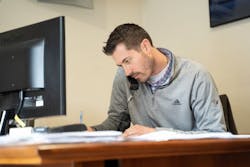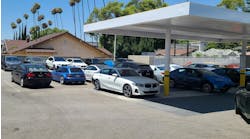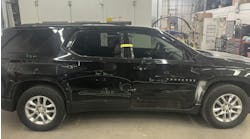Do you ever wonder how some of the collision repair industry’s top owners got their businesses to where they are today? Sure, a mix of moxie and entrepreneurial spirit steers their shops to success on a daily basis. But did you know that most shop owners are not afraid to admit that they’ve picked up tips and advice from others on their way to success?
That’s right—their daily inspiration is often bolstered by ideas that were passed along from their friends and peers, some from within the industry, others from down the street.
As we put another pandemic year in the rearview, FenderBender decided to take a deeper look at some of the best and most impactful advice the country’s top operators have ever received. If the conversations inspire you to success in 2022, then it was a good idea!
Tom Bemiller — CEO, The Aureus Group
When it comes to the best or brightest idea I’ve ever received, I have a two-parter. The first part is that I was told by a business-owner friend that the company should be a reflection of me as an owner. I mean that in terms of the culture. That was a big deal for me to get my head around, because I have three body shops that were three acquisitions. I did it wrong.
Each time I bought a shop, I attempted to adapt myself into the existing culture that was there. What I ended up with was three different shops with three different cultures and I really wasn’t even being me, because I was just trying to fit in with what was already there.
Then, 1(b) is hiring for culture fit, not for skills. Once I got really clear on who I am and why I do this and what I stand for, it became about finding people who align with those things. So finding people who align with me from a values perspective, finding people who get excited about the same things that I get excited about, who want to take the business to the same place that I want to take it. Once I started hiring people for culture fit first and skill set second, things really started to come together.
Gaining insight from successful business owners and studying is what makes a successful business owner, and it’s what I do to get inspired.
I’ve talked to enough leaders and read enough books to understand that I needed to make wholesale changes in my approach to business in order to be successful. I realized that I need to run the company differently, to create a different kind of company, where it’s not just about the results and the numbers, it’s really about the people, and by focusing on the people, the results and the numbers will all take care of themselves.
I look back on my early days as an owner and realize that it simply would not have worked to adapt to the culture put in place by the previous owners. I acquired the first shop in 2012, followed with another in 2013 and the third in 2016.
When I tried to adapt to the existing culture of those existing shops—the guys I bought the businesses from—they were car guys and they were fixing cars. That was their passion. So that was what the culture inside of those shops was like. I tried to adapt to fit into that, and it just didn’t work, because I have a whole different reason for doing this. So once I realized that, it became clear that I have to fill my team with people who are also passionate about fixing the way we fix cars, and that’s a totally different thing.
That approach can make hiring a difficult task, but I’ve found that my team members also appreciate carrying along their own “why” to my shops.
I want them to be saying, ‘I know there’s a better way and I want to be a part of building that better way.’ That’s the number one filter for me when I’m hiring somebody. If you’re not passionate about changing the way we are currently doing it, it’s not going to be a good fit so you’re not going to join my team. So, it was really about connecting with ‘The Why,’ my purpose.
Despite hiring from a more limited pool, I’m able to provide new hires with long-term prospects for growth. It’s so hard to find them because there’s just not a lot of them. But once they’re on my team, they’re really not leaving,” he says. “Because there’s total alignment. So even though my competitors right now, because the labor market is so tight, are doing crazy stuff like offering $10,000 signing bonuses on Day 1, my guys are sticking with me because what we’re doing is bigger than that. It’s more meaningful than that. I’m not losing them.
They don’t work for me because I’m paying them more than anybody else; they work for me because I’m about fixing the way we fix cars. It’s a different reason, it’s a different why.”
John Gardner — Body Shop Manager, Rydell Cars
John Gardner is the perfect example of what can happen when an up-and-coming employee has a mentor on staff who sets a daily standard.
Gardner, 30, is body shop manager at Rydell Cars in Grand Forks, N.D. For years, he watched and listened as now fixed ops director Randy Sattler went about his business, talking up each and every person in the shop.
“He had a lot of one-liners, that would be a good way to put it,” Gardner laughs.
Sattler has gone above and beyond to assist countless people in the industry, but he was also effective at making an impact on the next generation of leaders at his own business.
“One thing I’ve learned and been taught from my days as detail manager and car wash supervisor is how important it is to know a lot about your people, knowing their kids’ names. I have a technician that plays golf every Saturday. Every Friday, I ask him, ‘What’s your tee time tomorrow?’ And then on Monday, ‘how did golf go; how’d you hit?’ It’s the same two questions and he’s probably sick of me asking them. If they have kids, you ask them how their kids are by name,” Gardner says.
Especially for the more youthful shop staff members, working their way into supervisory roles can bring challenges. Gardner experienced that tall task firsthand, but managed to use his conversational skills to make it a smoother transition.
The shop staff eyebrows were raised so high by Gardner’s presence that they created a code name for him: “007.”
“They thought I was reporting back to Randy about what they were doing, so they gave me the nickname,” he says. “So I had a bit of a hill to climb and get them to understand that I’m not here to tattle on them, and I truly want to know how they’re doing, how their lives are.”
By now, it’s easy for the shop to see that Gardner and Settler go about things in different ways.
“Randy and I are very different people, like big-time, majorly,” Gardner says. “There was a level of respect for him already. I knew that I wouldn’t get the respect of our people by the process and all that. I knew I would have to earn their respect by knowing them. I just think that because of my age, it was different from the way Randy had to do it. He for sure knew people, but I would spend an hour of my day just literally talking to people.”
Some might call it the “new way” in terms of how the supervisor and employee interact. Gardner references a technician who is a deer hunting fanatic:
“We’re friends on Snapchat and he’s sending me pictures on Snapchat of him up in the deer stand, or showing me his deer. In the past, I know it was like, ‘Whoa, you don’t do that kind of thing.’ I guess I look at it like I’m only 30 years old. My best friend is a manager in the dealership as well. Sometimes we become friends with people we work with. He used to be one of my employees and now he’s a manager with me.”
Michael Giarrizzo — CEO, DCR Systems
Michael Giarrizzo certainly knows a thing or two about business growth ideas. Look no further than the success he found as vice president and chief operating officer of Sterling Auto Body Centers, which had locations in 10 states during his time. These days, Giarrizzo, CEO of Ohio-based DCR Systems, is capitalizing on an idea that he recalled from early in his career.
“When you’re going after a better business idea, you need to have a complete understanding of it. From the value proposition to the stakeholders, you have to be 100 percent sure of yourself,” he says.
And with that, the DCR Systems Claims Portal is chartering a larger footprint as it launches in all eight shops. Giarrizzo says the claims portal provides instant remote access to claim information. It’s meant to streamline the settlement process while eliminating excess time spent on handling claims. Adjusters can use the tool to settle claims without needing to physically be in the shop, he says.
Giarrizzo describes the portal as “an evidence package and an oversight package of the repairs. It takes the need to actually come out physically on site completely off the table. There’s no need for that. It organizes all of the evidence by line item or section of the repair regardless of the estimator database. So, let’s say we’re replacing a quarter panel on a 2018 Camry. We’ll have photos, videos explaining the need, it also has the manufacturer’s work instructions attached to it, position statements, the invoice for the quarter panel.”
At the heart of Giarrizzo’s big idea is the confidence that it is, in fact, a better way.
“In our non-DRP world that we live in and that we’ve chosen, we realize there’s now a hurdle, and it’s affecting the customer base with the length of time and even unintended delay or friction that’s created by that,” he says. “You can’t expect an insurance adjuster to really have any chance of keeping up, so this allows them to get that information without having to try to dig it up and interpret it themselves and then determine if it’s necessary or not.”
Bob Arnold — 5-Star Collision & Glass
At 5-Star Collision & Glass Center in Grand Forks, N.D., the add-on resides clearly in the shop’s name: it’s glass. The importance of the glass repair and replacement side of the shop has taken a marked turn during the past two years, according to manager Bob Arnold, mostly as a way to increase its base of customers (which it’s done successfully, boasting a car count that rivals collision repairs).
“The last two years we have really attacked that glass business,” Arnold says. “When we see a customer every 10 years on average on the collision side, it gets hard to stay top of mind and have the customer remember you during their time of need. With the glass business, we’re seeing a lot more customers.”
Whether it’s repairing windshield chips or cracks or providing full replacements to windshields and door windows, Arnold views the shop’s offerings as a chance to engage with new and perhaps unfamiliar customers. The shop touts that it’s able to repair nicks and chips in less than an hour in many cases.
“It’s a chance for us to market ourselves so when that time does come when they need the collision repair service, they know where to turn,” Arnold says.
Doug Voelzke — owner, Doug’s Custom Paint and Body
If you decide to purchase some acreage next to your current collision repair shop, you will likely need the grass to be cut. And that service will likely cost more than you want to spend. So then, consider adding a zero-turn mower line to your offerings so that you can cut the grass yourself and give your business another revenue stream.
That’s similar to how Doug Voelzke, owner and CEO of Doug’s Custom Paint & Body in Mitchell, S.D., became a mower dealer.
“I bought the property that adjoined mine and I paid a guy twice to mow it,” Voelzke says. “I thought it was kind of expensive, so I had to look at a different option. I got a card in the mail that this company had zero-turn mowers, so I started checking out the Hustler brand and I really liked how their values lined up with mine.”
After adding the Hustler brand to his business in 2007, Voelzke has been one of the brand’s top-selling locations annually in South Dakota.
For those body shop dealers who are interested in taking an untraditional add-on like zero-turn mowers, don’t expect an immediate flood of new business, Voelzke says. In his first year of selling Hustler mowers, he sold only one machine as he didn’t become a partner until late in the summer.
He sold seven the following year, followed by sales of 25, then 50 and 100 in ensuing years.
“Our number [in September 2021] for the year is 231. It’s a big part of our business. It’s a $1 million business and it will be multi-million,” Voelzke says. “The bigger side of it is that we’ve been able to improve our collision repair business because of it. We simply get customers we would not have reached without the Hustler line. I have a lot of customers who cross-pollinate, coming from 100-150 miles away who bought a Hustler and now get their repair work done with us.”
Combine mower sales and service along with the body shop and Voelzke expects that his company will exceed 3,000 customer touches for 2021.
For shop owners who decide that mowers or another product line is the right fit, Voelzke says that it’s imperative to know your market. Voelzke knows his clientele and because of that usually keeps 80-90 mowers on site. He ordered his allotment early in the process this year, so his allotment of mowers was expected to have been ramped higher than average during the fourth quarter.
“If you 100 percent know your balance sheet and P&L and you’re so dialed in that you don’t even have to wonder about any of that stuff, I’d say go for it,” he offers. “But if you don’t have that figured out, then don’t do it.”




